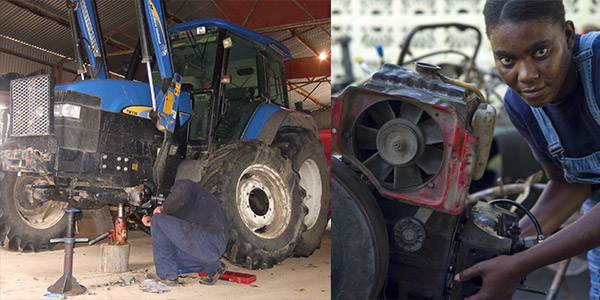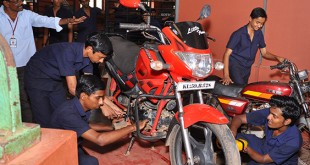ITI In Mechanic Tractor
Tractor repairs train to modify, repair or update ranch machinery and equipment. Key to a tractor repair preparing educational module is the investigating and mechanical insight that expert repairers must show when performing duties.
Skills Required
- Repairing – Repairing machines or frameworks utilizing the required apparatuses.
- Gear Maintenance – Performing routine upkeep on hardware and deciding when and what sort of upkeep is required.
- Investigating – Determining reasons for working blunders and choosing what to do about it.
- Quality Control Analysis – Conducting tests and assessments of items, administrations, alternately methods to assess quality or execution
- Discriminating Thinking – Using rationale and thinking to recognize the qualities and shortcomings of option arrangements, conclusions or ways to deal with issues
- Operation Monitoring – Watching gages, dials, or different markers to verify a machine is working appropriately.
- Operation and Control – Controlling operations of gear or frameworks.
- Gear Selection – Determining the sort of apparatuses and hardware expected to do work
- Complex Problem Solving – Identifying complex issues and checking on related data to create and assess choices and execute arrangements.
- Dynamic Listening – Giving full consideration regarding what other individuals are stating, taking time to comprehend the focuses being made, making inquiries as fitting, and not hindering at improper times.
- Talking – Talking to others to pass on data successfully.
- Judgment and Decision Making – Considering the relative expenses and advantages of potential activities to pick the most suitable one.
- Time Management – Managing one’s own particular time and the time of others.
- Dynamic Learning – Understanding the ramifications of new data for both present and future issue -understanding and choice making.
- Composing – Communicating successfully in composing as fitting for the needs of the gathering of people.
- Observing – Monitoring/Assessing execution of yourself, different people, or associations to make changes or make remedial move.
- Social Perceptiveness – Being mindful of others’ responses and comprehension why they respond as they do.
- Perusing Comprehension – Understanding composed sentences and passages in work related reports.
- Administration Orientation – Actively searching for approaches to help individuals
- Coordination – Adjusting activities in connection to others’ activities.
- Science – Using math to take care of issues.
- Influence – Persuading others to alter their opinions or conduct.
- Learning Strategies – Selecting and utilizing preparing/instructional systems and systems fitting for the circumstance when learning or showing new things.
- Administration of Personnel Resources – Motivating, creating, and coordinating individuals as they work, distinguishing the most ideally equipped individuals for the employment.
- Frameworks Analysis – Determining how a framework ought to function and how changes in conditions, operations, and the earth will influence results.
Nature of Job
- Repairing and Maintaining Mechanical Equipment – Servicing, repairing, changing, also, testing machines, gadgets, moving parts, and hardware that work fundamentally on the premise of mechanical (not electronic) standards.
- Working Vehicles, Mechanized Devices, or Equipment – Running, moving, exploring, or driving vehicles or automated hardware, for example, forklifts, traveler, vehicles, airplane, or water make.
- Taking care of and Moving Objects – Using hands and arms in taking care of, introducing, situating and moving materials, and controlling things.
- Settling on Decisions and Solving Problems – Analyzing data and assessing results to pick the best arrangement and tackle issues.
- Investigating Equipment, Structures, or Material – Inspecting gear, structures,on the other hand materials to recognize the reason for slips or different issues or deformities.
- Overhauling and Using Relevant Knowledge – Keeping progressive actually and applying new information to your occupation.
- Performing General Physical Activities – Performing physical exercises that require impressive utilization of your arms and legs and moving your entire body, for example, climbing, lifting, adjusting, strolling, stooping, and treatment of materials.
- Speaking with Supervisors, Peers, or Subordinates – Providing data to administrators, colleagues, and subordinates by phone, in composed structure, email, or in individual.
- Getting Information – Observing, accepting, and generally acquiring data from every single pertinent source.
- Arranging, Planning, and Prioritizing Work – Developing particular objectives and plans to organize, compose, and achieve your work.
- Controlling Machines and Processes – Using either control instruments or direct physical movement to work machines or techniques (excluding PCs or vehicles).
- Repairing and Maintaining Electronic Equipment – Servicing, repairing, aligning, regulating,fine-tuning, or testing machines, gadgets, and hardware that work principally on the premise of electrical or electronic (not mechanical) standards.
- Assessing the Quantifiable Characteristics of Products, Events, or Information -Estimating sizes, separations, and amounts; or deciding time, costs, assets, or materials expected to perform a work movement.
- Distinguishing Objects, Actions, and Events – Identifying data by arranging, assessing, perceiving contrasts or likenesses, and identifying changes in circumstances or occasions.
- Thinking Creatively – Developing, outlining, or making new applications, thoughts, connections, frameworks, or items, including masterful commitments.
- Corresponding with Persons Outside Organization – Communicating with individuals outside the association, speaking to the association to clients, general society, government, and other outer sources. This data can be traded in individual, in composing, or by phone or email.
- Screen Processes, Materials, or Surroundings – Monitoring and inspecting data from materials, occasions, or the earth, to recognize or survey issues.
- Assessing Information to Determine Compliance with Standards – Using important data and individual judgment to figure out if occasions or methodologies agree to laws, regulations, or benchmarks.
- Collaborating With Computers – Using PCs and PC frameworks (counting equipment and programming) to program, compose programming, set up capacities, enter information, or methodology data.
- Breaking down Data or Information – Identifying the hidden standards, reasons, or truths of data by separating data or information into particular parts.
- Recording/Recording Information – Entering, translating, recording, putting away, alternately keeping up data in composed or electronic/attractive structure.
- Judging the Qualities of Things, Services, or People – Assessing the worth, significance, or nature of things or individuals.
- Creating and Maintaining Interpersonal Relationships – Developing useful and helpful working associations with others, and keeping up them over the long haul.
- Translating the Meaning of Information for Others – Translating or clarifying what data implies and how it can be utilized.
- Translating the Meaning of Information for Others – Translating or clarifying what data implies and how it can be utilized.
- Preparing and Teaching Others – Identifying the instructive needs of others, creating formal instructive or preparing projects or classes, and educating or training others.
- Offering or Influencing Others – Convincing others to purchase stock/products or to generally alter their opinions or activities
- Give Consultation and Advice to Others – Providing direction and master exhortation to administration or different gatherings on specialized, frameworks , or procedure related subjects.
- Booking Work and Activities – Scheduling occasions, projects, and exercises, as well as the work of others.
- Honing and Developing Others – Identifying the formative needs of others and honing, tutoring, or generally helping other people to enhance their learning or aptitudes.
Syllabus
Induction Training
- Use of Fitter’s hand tools care and maintenance of tools , filing practice.
- Filling –Filling to line marking off –use of center punch, dividers , calipers, steel rule etc. Filling true and square.
- Chipping , grinding of chisels hacksawing.
- Simple drilling . Use of taps and dies. Use of hand reamers.
- Introduction to centre lathe , setting up work between centers. Use of side cutting tools. Parallel turning and stipped turning.
- Joining of metals by soft soldering. Simple marking out of metals by gas and electric welding.
- Simple sheet metal work cutting, bending & simple fold joints.
- Pipe Bending and appealing, fitting of nipples & unions by soldering, brazing by using blow lamp.
- General cleaning, oiling and greasing of tractors. Checking and tightening of bolts and nuts. Function of different parts of the tractor.
- Checking engines auxiliaries, fuel , oil and cooling system, practice in starting, running and stepping engine.
- Removing wheels from tractors; checking tyres for wear and tubes for leaks. Repairing puncture.
- Practice on refitting tyres and tubes and wheels and inflating the correct pressure.
Eligibility & Admission
- Should Have Passed 8th Class Examination under 10 + 2. System of Education or Its Equivalent.
- Desirable: Passed 10th Class Examination Under 10 + 2 Systems of Education with Science (With Physics & Chemistry as one of the subject or its equivalent).
Employers
The major job providers are farm equipment dealers.
 Courses and Colleges after 10th After 10th, What Next?
Courses and Colleges after 10th After 10th, What Next?








